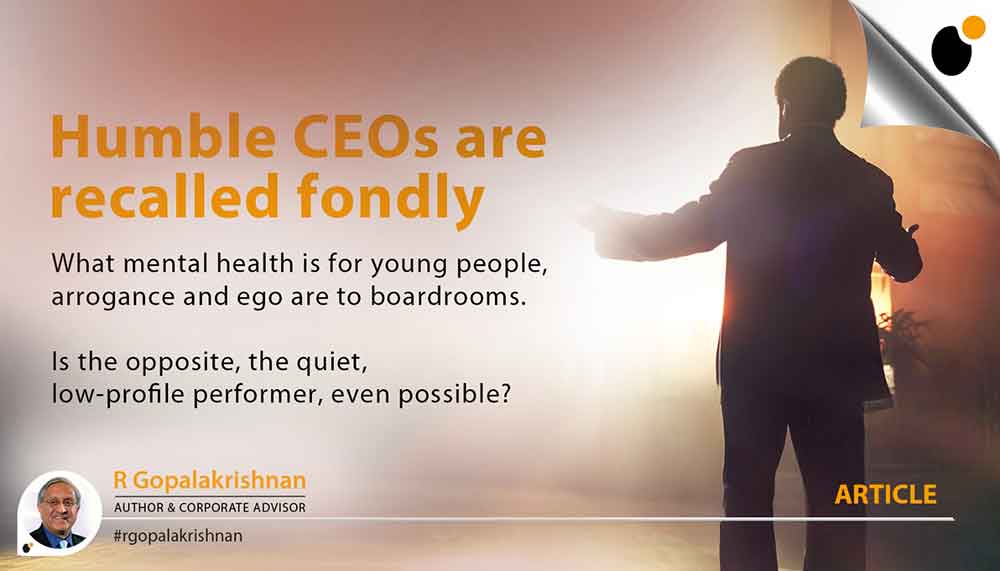26th March 2020 BUSINESS STANDARD
Conzerv Systems and HUL
Gopalakrishnan*
(*The writer is an author and corporate advisor. He is a Distinguished Professor of IIT Kharagpur. He was a Director of Tata Sons and a Vice Chairman of Hindustan Unilever).
Email: rgopal@themindworks.me
Unleash passion, purposeful culture and positivity. They constitute people power, which is the best immunization for the company.
Ms Abigail Disney, heir to the fortune and granddaughter of the legendary Walt Disney, last week launched a tirade against the company management. The reason was management’s decision to reduce the pay of 100,000 workers while protecting executive bonus and dividends worth $ 1.5 billion. She said, “Pay the people who make the magic happen with respect and dignity.” This demonstrates the dissonance between profit and people orientation.
COVID has demonstrated that, like humans, organizations also need to guard against the invisible attackers. We cannot assure thriving human or organizational health while ignoring invisible attackers. I suggest an uncommon prescription to neutralize an invisible attack on companies: to unleash people power.
Reflective executives should use the quiet of the lockdown to plan the future agenda. The focus on unleashing people power can appear to be soft—centering around passion, culture and positivity—but it can make a company resilient in the face of attacks from new sources. Engaged people are the best immunity. Long-life companies Unilever and Tata have demonstrated.
Corporate immunology
A company is prone to invisible, virus-like attack, like employee disengagement, inconsistent leadership behavior and negativity in the workplace. It is urgent for managers to immunize their company against invisible attacks. To connect immunology with a company, I studied the writings of Prof Michael Watkins, an immunologist-turned-management academic and I was inspired by his writings on HBR.org 11th June 2007.
The immune system is an active communication network among a complex set of cells, antibodies and signaling mechanisms. These elements are arranged in three layers: outermost is the physical layer, like our skin and the mucous system; the second is the innate layer, which is the protective layer of cells that we are born with; finally there is the adaptive layer, which refers to the mechanisms that recognize and respond to an attack.
What are the equivalents for a company? The finest immunity is provided by responsive people in the company, arranged in three layers: first, the physical, passion; second, the innate, culture; and third, the adaptive layer, positivity.
Passion
A highly engaged workforce is the physical layer of company immunization. Engaged employees care for the company deeply, recommend the company to non-employees, work collaboratively and emotionally guard the company against unwelcome attackers. Employee engagement data for the last decade and a half shows that in most companies everywhere, employee engagement has steadily declined. This is an unfavorable trend; perhaps managers are too focused on efficiency improvements with diminished attention to people.
Culture
The human immune system works by recognizing what is ‘self’ and ‘non-self’, and by maintaining an equilibrium between over-reaction and under-reaction. Every organization has a political system and culture, which defines what is perceived as ‘self.’ Culture acts like the second layer, innate layer of the immune system, by preventing destructive thinking from invading the company.
Every company has an articulated or implicit corporate purpose, which is the basis for the employees’ concept of ‘self’. For example, in normal times, technologists and infrastructure-oriented managers scoff at consumer marketers and makers of soap or toilet cleaners. During COVID times, employees in Unilever-type companies get a sense of renewed purpose, just as hospitals and medical professionals do.
Positivity
Psychology Professor Barbara Fredrickson is a thought leader in positive psychology. When the ratio of positivity to negativity is equal to 3, then employees are positive and build resilience to adversity. 80% of American employees are less than 3; I wonder about Indian employees. She has developed a technique to measure positivity and negativity. In my experience, when leaders vivibly practice good listening and empathy, positivity increases.
Humans fight invasive threats through an adaptive mechanism—the brain and the senses, analogous to top leadership and the far ends of the organization respectively. The signals of external attack are first sensed at the periphery, that is, front-line salesmen and the factory workers. Organizations must sharpen their listening and response mechanisms; they must welcome diverse expert opinions. That is how management can secure employee engagement and positivity, just as WHO recommends community involvement as the most important response to COVID.
In short, this is a call to managers to reflect on how to unleash passion, purposeful culture and positivity. Together, they constitute people power, which is the best immunization for the company. Think about what you should do about this after lockdown. Leaving it as a top leadership agenda is a mistake.



